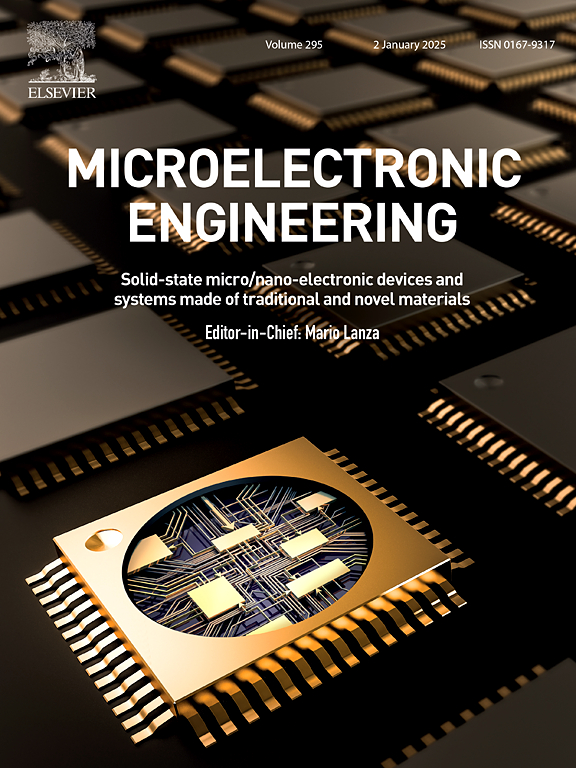Fabrication of uniform, periodic arrays of exotic AlN nanoholes by combining dry etching and hot selective wet etching, accessing geometries unrealisable from wet etching of planar AlN
IF 3.1
4区 工程技术
Q2 ENGINEERING, ELECTRICAL & ELECTRONIC
引用次数: 0
Abstract
Aluminium nitride (AlN) is a wide bandgap semiconductor with far reaching realised and potential applications in electronics and optoelectronic technology. For example, gallium nitride (GaN) quantum dots (QDs) housed within an AlN matrix are attractive due to the large bandgap offsets. However, making suitable AlN sites to house GaN QDs is challenging due to the difficulty in fashioning 3D AlN structures. This results from AlN's strong bonds that are difficult to chemically etch.
Whilst dry etching of AlN nanostructures has been explored, wet etching at the nanoscale has been limited by the common exposed facet of AlN being etch-resistant. Hence, wet etching of AlN to create uniform arrays of periodic nanohole nanostructures has, thus far, not been heavily explored.
In this paper, an initial dry etching of a 2D AlN planar template is used to expose alternative wet-etchable facets so that periodic arrays of nanohole structures are revealed by wet-etching. Both a study of different initial dry etched structures, including tapered nanoholes, and wet etching time were performed. A model to describe the dynamics of wet etching on the different dry etched nanohole structures is proposed. Periodic arrays of uniform nanohole features are realised that hold promise for applications such as the housing of site-controlled quantum dots.

将干法蚀刻和热选择性湿法蚀刻相结合,制造出均匀、周期性的奇异氮化铝纳米孔阵列,获得平面氮化铝湿法蚀刻无法实现的几何形状
氮化铝(AlN)是一种宽带隙半导体,在电子和光电技术领域具有深远的应用前景和潜力。例如,氮化镓(GaN)量子点(QDs)被安置在氮化铝基体中,由于具有较大的带隙偏移,因此很有吸引力。然而,由于难以形成三维氮化镓结构,因此制造合适的氮化镓基点来容纳氮化镓量子点具有挑战性。虽然对氮化铝纳米结构的干法蚀刻已经进行了探索,但纳米尺度的湿法蚀刻却因氮化铝的普通裸露面具有抗蚀刻性而受到限制。因此,迄今为止,还没有人对通过湿法刻蚀氮化铝来创建均匀的周期性纳米孔纳米结构阵列进行过深入探讨。本文利用二维氮化铝平面模板的初始干法刻蚀来暴露可供选择的湿法刻蚀面,从而通过湿法刻蚀显示出周期性纳米孔结构阵列。对不同的初始干蚀刻结构(包括锥形纳米孔)和湿蚀刻时间都进行了研究。提出了一个模型来描述湿蚀刻对不同干蚀刻纳米孔结构的动态影响。均匀纳米孔特征的周期性阵列得以实现,有望应用于场所控制量子点的封装等领域。
本文章由计算机程序翻译,如有差异,请以英文原文为准。
求助全文
约1分钟内获得全文
求助全文
来源期刊

Microelectronic Engineering
工程技术-工程:电子与电气
CiteScore
5.30
自引率
4.30%
发文量
131
审稿时长
29 days
期刊介绍:
Microelectronic Engineering is the premier nanoprocessing, and nanotechnology journal focusing on fabrication of electronic, photonic, bioelectronic, electromechanic and fluidic devices and systems, and their applications in the broad areas of electronics, photonics, energy, life sciences, and environment. It covers also the expanding interdisciplinary field of "more than Moore" and "beyond Moore" integrated nanoelectronics / photonics and micro-/nano-/bio-systems. Through its unique mixture of peer-reviewed articles, reviews, accelerated publications, short and Technical notes, and the latest research news on key developments, Microelectronic Engineering provides comprehensive coverage of this exciting, interdisciplinary and dynamic new field for researchers in academia and professionals in industry.
 求助内容:
求助内容: 应助结果提醒方式:
应助结果提醒方式:


